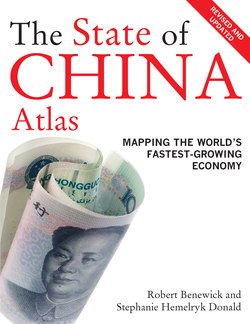Читать книгу The State of China Atlas - Robert Benewick - Страница 32
На сайте Литреса книга снята с продажи.
ОглавлениеOne third of the growth in the world’s economy in 2008 was contributed by China.
Part Three THE ECONOMY
The Chinese economy is central to global financial development, but is neither predictable nor static. Given the instability in global capitalism and the apparent fragility of the banking sector, as evidenced by the 2008 crash, the only certainty about the economy in China is that nothing is as certain as it ideally should be. Over the past 30 years, China has shifted from a command economy to the expansion of corporate capitalism and investment, and latterly to a beckoning future as the world’s leading knowledge and innovation center. In early 2008, the Premier indicated that the social structure needed time to keep pace with the speed of growth, which is having a profound impact on social and environmental conditions. Starting perhaps with the town and village enterprises of the 1980s, China has striven to become an entrepreneurial environment, with individuals increasingly mindful of the shrinking welfare state and the growth of private wealth, and of their place in that scenario. Wealth has created a demand for private cars, luxury goods and high-quality housing. For the nation as a whole it has afforded the chance to engage in large infrastructure projects, connecting the nation with high-speed communications systems, transport, and, of course, symbolic undertakings such as the Asian Games, the Olympic Games and the Shanghai World Expo. In the wake of the Tibetan uprising in 2008, Wen Jiabao again emphasized the need to increase infrastructure links between the autonomous regions in the west and the eastern seaboard provinces. He is of a new generation of politicians who recognize that a strong state and economy are underpinned by the soft power of media and events. Thus, state investment in good intra-provincial links not only increase domestic trade, but also shores up internal stability, through the movement of goods, people and acceptable ideas. China’s formal entry to the world economy was marked by its accession to the World Trade Organization in 2001. At the time the Party-State saw the WTO as a “wrecking ball” that would sort out the weak from the strong with as little political unrest as possible. The benefits of an international system include the opportunity for the State to blame overseas issues for failure and local wisdom for success. There have been several landmark moments since 2001, including the meltdown of the markets late in 2008, which had begun to shake stock markets in Shanghai several months earlier. Although the Chinese stock market does not attract personal savings to the extent it does in the West, and although the Shanghai market has a tendency to volatility, the failure of the markets in 2008 was seen as yet another example of anti-Chinese behavior by the West in the Olympic year. Outbursts of nationalism are symptomatic of the challenges the government faces in managing the economy. It wishes to retain total political power (largely based on nationalism over other ideologies) but without letting the country slip either into isolationist panic or internal scuffles over financial and social rights. The second, and related, challenge is to balance the needs of the population with a sustainable level of growth, especially in years of recession amongst China’s major trading partners. It is estimated that China requires at least 7 percent annual growth simply to keep the domestic population on an even financial keel, and more than that to sustain important reforms in education access, rural development and agricultural expansion.
35
